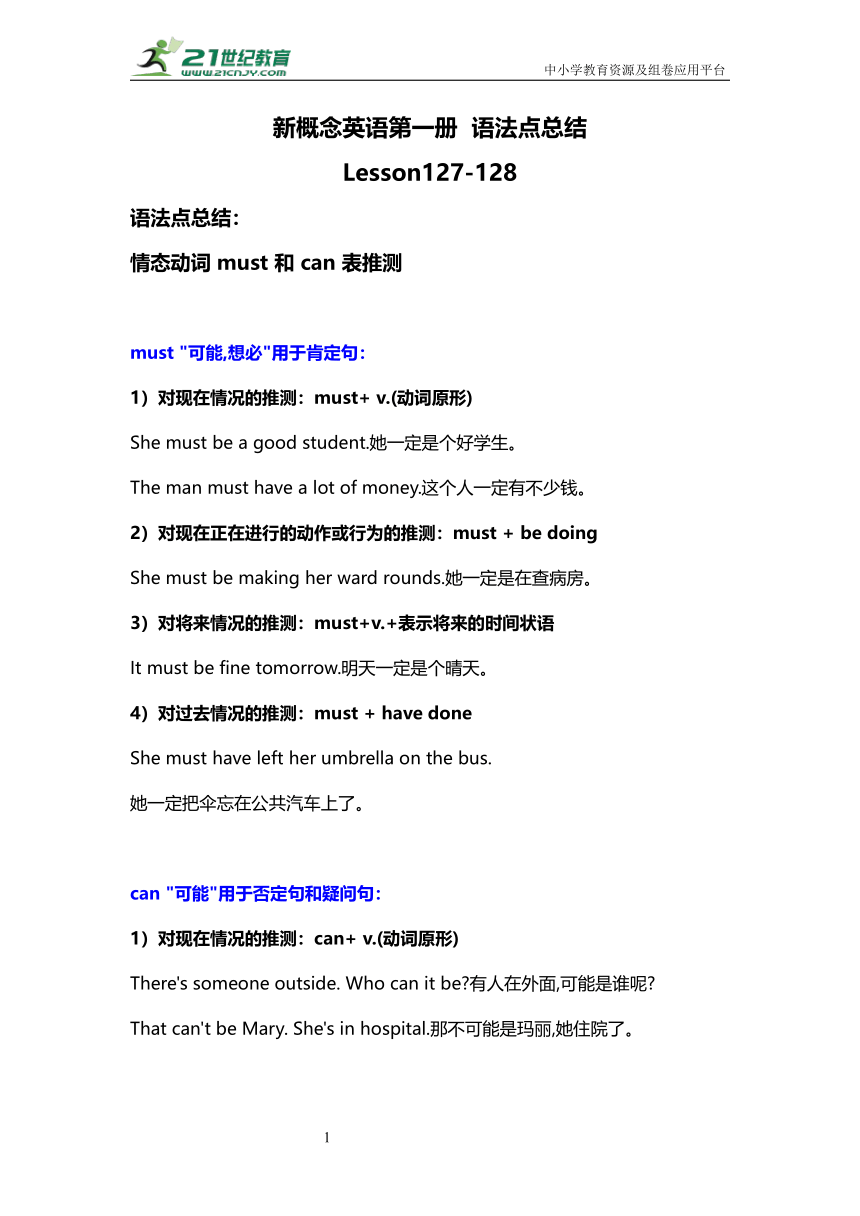
中小学教育资源及组卷应用平台 新概念英语第一册 语法点总结 Lesson127-128 语法点总结: 情态动词 must 和 can 表推测 must "可能,想必"用于肯定句: 1)对现在情况的推测:must+ v.(动词原形) She must be a good student.她一定是个好学生。 The man must have a lot of money.这个人一定有不少钱。 2)对现在正在进行的动作或行为的推测:must + be doing She must be making her ward rounds.她一定是在查病房。 3)对将来情况的推测:must+v.+表示将来的时间状语 It must be fine tomorrow.明天一定是个晴天。 4)对过去情况的推测:must + have done She must have left her umbrella on the bus. 她一定把伞忘在公共汽车上了。 can "可能"用于否定句和疑问句: 1)对现在情况的推测:can+ v.(动词原形) There's someone outside. Who can it be 有人在外面,可能是谁呢 That can't be Mary. She's in hospital.那不可能是玛丽,她住院了。 2)对现在正在进行的动作或行为的推测:can + be doing He can't be waiting for us.他不可能还在等我们。 3)对将来情况的推测:can+ v.+ 表示将来的时间状语 He can't be at home tonight.今晚他不可能在家。 4)对过去情况的推测:can + have done He can't have done such a thing. 他不可能做出这种事。 知识点拓展: 情态动词除了must, can可以表示推测, could, may / might均可表示推测,它们可以对过去、现在或将来的情况作出语气强弱不同的推测。在运用情态动词表示推测时,我们应该着重把握以下两点: 1. 把握推测语气的特点,选择恰当的情态动词。 (1) 表示肯定的推测时,各情态动词语气从弱到强依次为might→may→could→can→must;表示否定的推测时,can’t / couldn’t语气较强,意为“不可能”;may not / might not语气较弱,意为“可能不”。 【注意】must的否定形式mustn’t不表示否定推测,而是表示“不许可”或“不应该”。 (2) 情态动词表示推测时,在用法上有一些限制: l must只用于肯定句中,意为“一定,准是”。Eg: They have been working hard all day. They must be tired. 他们一整天努力工作,一定很疲倦。 l can多用于否定句或疑问句中,could可用于各种句式。Eg: Can the story be true 这故事能成真吗? Simon can’t be at home, for I saw him going shop-ping just now. Simon一定不在家的,因为我刚看见他去购物了。 You mustn’t smoke when you are walking around in the wood. You could start a fire. 当你散步在树林时一定不要吸烟,因为这可能会引发火灾。 l may / might用于肯定句和否定句中。Eg: It may or may not rain. I’m not sure. 我不确定会不会下雨。 Peter might come with us tonight, but he isn’t very sure yet. Peter可能今晚会和我们一起,但他目前还不确定。 2. 确定被推测时间,正确判断动词时态。 (1) 对现在或将来的情况进行推测时,用“情态动词+do”。Eg: Mr. Reed looks pale. He may be ill. Reed先生看起来脸色苍白,他可能生病了 If you don’t have a guide, you could lose your way. 如果你没有一个向导,那你可能会迷失方向。 (2) 对此时此刻正在进行的情况进行推测时,用“情态动词+be+动词-ing形式”。Eg: At this moment, our teacher must be correcting our exam papers. He could be doing his homework in his room now. He may be waiting for you now. (3) 对过去的情况进行推测时,用“情态动词+have+过去分词”。Eg: The road is wet. It must have rained last night. Mars couldn’t have watched TV yesterday for he knew they would have an exam. He didn’t come to sch ... ...
~~ 您好,已阅读到文档的结尾了 ~~